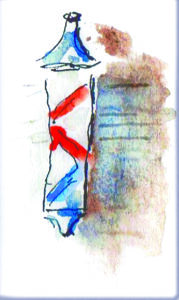walkingwiththunder.com
The barbershop
By Conrad Beaubien
I think it’s more than just the fact that my grandfather was a barber that I always feel comfortable when getting sheared. I say sheared because it seems like a lot of grey wool accumulates on my chin and head over winter months, and in timing with the shearing of alpacas and sheep I kinda fall in line with the idea that spring is in the air and maybe getting into the barber shop might bring it on sooner.
In his youth, my grandfather Henri Beaubien was part of an out-migration of mainly unskilled labour from the province of Quebec that occurred between 1890 -1930. At the time, his home province’s small scale industries were focused in urban centres and agricultural acreage was hard to acquire due to the remnants of the feudal seigneury system and division of land, a hangover from French colonists.
Instead of looking to western Canada to resettle, families envisioned that south to the US could offer a future. The New England States that lay at the borders of the province of Quebec were in the midst of unprecedented expansion of industry, mainly cotton mills built along various river systems. There was plenty of water power available in places like Lowell, Massachusetts, Woonsocket, Rhode Island and Lewiston, Maine. The US/Canada border had little restrictions and while French was the mother tongue of the new arrivals, language barriers were gradually overcome as chain migration expanded enclaves of French speakers. The Catholic Church and its patriarchal teaching system followed the migration and over time ‘Little Canada’ ghettoes developed, large families in tiny worker houses squashed between factories and tall Catholic churches. In my mind the scene is reminiscent of the descriptions held in the writings of Charles Dickens. By 1900, one-tenth of the New England population spoke French, 44 per cent of its workforce coming from Quebec. By 1930 nearly a million people had crossed the border into the US.
 Henri Beaubien landed work in a Rock of Ages granite quarry in New Hampshire. He was single and invested his time off into making a violin, something he had started to play as a boy. After a few years and with failing health he returned to his home town of Shawinigan Falls, Quebec and was diagnosed with silicosis of the lungs as a result of breathing in stone dust from the quarry he worked in. A career in barbering was suggested as requiring lesser physical exertion, and after training in Montreal, Henri returned to set up shop in Shawinigan.
Henri Beaubien landed work in a Rock of Ages granite quarry in New Hampshire. He was single and invested his time off into making a violin, something he had started to play as a boy. After a few years and with failing health he returned to his home town of Shawinigan Falls, Quebec and was diagnosed with silicosis of the lungs as a result of breathing in stone dust from the quarry he worked in. A career in barbering was suggested as requiring lesser physical exertion, and after training in Montreal, Henri returned to set up shop in Shawinigan.
As I look around John’s Barber Shop on Main Street, Picton, where I am enjoying a hair overhaul—wash, hair cut, beard trim, all with the talented hand of Elaine and while carrying on simultaneous conversation with owner Michelle cutting hair in the adjacent chair, the atmosphere of the place conjures the earliest of childhood memories of sitting on the padded riser board that spanned two arms of the barber chair in my grandfather’s barber shop. On the walls of John’s are combined souvenirs kept over from the previous owner of the shop mixed with the most recent— photos of a trophy-size fish caught in Lake Ontario; over there a photo of Miss Supertest, the Canadian-built hydroplane that in 1957 achieved a world speed record on water of 297 km/hr (184 mph) in Picton harbour. Customers sitting and awaiting as they read magazines are immersed in an atmosphere, conversation and artefacts that delineate the story of community.
When my grandfather Henri returned from the US he returned with the benefit of having learned a second language—English. This turned out to be a contributor to the success of his business in a predominantly Frenchspeaking community. At the time, the large number of industries that had developed along the St. Maurice River—which ran through his hometown—was mainly managed by English speakers from the US and Britain. Henri’s shop was to become a favourite in town as he expanded his bilingual business as a tobacconist supplying fine wooden tobacco pipes, cigars and chewing tobacco to the local population.
My home today has many of the souvenirs from my grandfather’s barber shop passed down through family. Over there sits one thing I cherish the most—the violin Henri made while living and working in New England. It’s a daily reminder of the tunes he played whenever the family gathered in the ancestral home in Shawinigan. It’s also a reminder of a little known part of history. Look in the phone directories of places throughout the New England States today and many a French surname will seem familiar.

Comments (0)